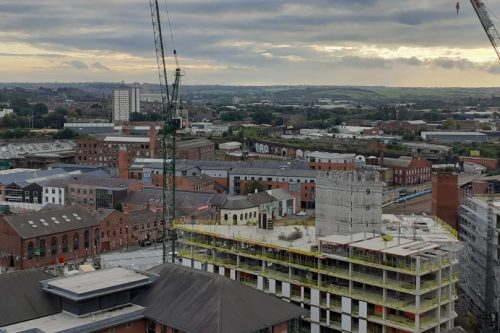Five challenges for environmental placemaking

A panel of property experts highlighted some of the obstacles to constructing developments which respond to the need to protect the environment.
They spoke during TheBusinessDesk.com’s recent breakfast seminar at Platform, in Leeds city centre, was held in partnership with Shulmans LLP and Bruntwood.
Participants said some deeply ingrained habits in the industry would need to be broken to meet the demands of the environment.
The speakers included Chris Thompson managing director of sustainable urban developer Citu.
Thompson warned that even though awareness of the threat posed by climate change was now widespread, not all developers are changing their methods of working.
He said: “We’re still building places that are sub-optimal in terms of energy performance and which are disconnected from transport networks. It makes me mad that we’re continuing to build places like that.
“We have people living in places disconnected from the city, in houses that do not perform well.
“We’ve become used to siloing our cities – ie ‘we’ll live over here, but shop over there’ – but that’s not how we function.”
Chris Gorse, Professor of construction and project management at the School Of Built Environment, Engineering And Computing, said another obstacle is learning how to communicate the urgency of the problem, even though the the scientific consensus leaves little room for doubt.
“When we were looking at global warming 20 years ago the statistics then were worrying enough,” he said.
“But looking at how CO2 levels have increased since then is extremely frightening.
“However, it still isn’t easy to communicate problems related to climate change. People’s perception is that, ‘we’re O.K., no one is dying at the moment’. We have to put this on the agenda as being about public health and well-being.
“These are complex issues which we have to distil down.
“For example, would we want to part with a bit more money and live in a smaller house which is more energy efficient? These are choices we’ll have to make.”
Amanda Beresford, a partner at Shulmans and head of the firm’s planning law team, pointed out that ensuring building developments make use of available renewable energy sources is not a straightforward matter.
She said: “If a development can use renewable energy it should do so, but in planning terms could we make the developer use that particular energy source?

April Marsden, who is an associate at architecture practice Bowman Riley, also focused on how much local authorities can realistically expect of developers.
She noted property developers must already adhere to planning conditions which, for example, might stipulate they install vehicle charging points, a sustainable urban drainage system or flood defences.
She warned that if such “ask lists” are extended further to take into account climate change, developers could argue the cost of meeting these additional demands mean their schemes are no longer financially viable.
Marsden pointed out that under permitted development rights, which allow developers to convert office properties into residential uses, local authorities are not able to use section 106 to get developers to make extra contributions to help the environment.
Angela Barnicle, chief officer for asset management and regeneration at Leeds City Council, said she believed that it is the consumer who can drive the necessary changes in behaviour.
“I’m not a planner but climate change is real and it is going to influence our decision-making,” she added. “Let’s hope that our planning system will become more responsive in the timescale the climate needs.”










